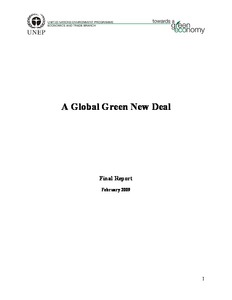A global green new deal : final report
"Global Crises In 2008, the world was confronted with multiple crises - fuel, food and financial. The result of these crises has been the worst global economic recession since the Great Depression of the 1930s. In 2009, for the first time in decades, the volume of world trade is projected to d...
| Main Author: | |
|---|---|
| Institution: | ETUI-European Trade Union Institute |
| Format: | TEXT |
| Language: | English |
| Published: |
Geneva
2009
UNEP |
| Subjects: | |
| Online Access: | https://www.labourline.org/KENTIKA-19188746124919069289-a-global-green-new-deal-final-.htm |
| Summary: | "Global Crises
In 2008, the world was confronted with multiple crises - fuel, food and financial. The result of these crises has been the worst global economic recession since the Great Depression of the 1930s. In 2009, for the first time in decades, the volume of world trade is projected to decline as global per capita income contracts. The number of unemployed globally could rise this year by between 18 million and 51 million over 2007 levels. Every 1 per cent fall in growth in developing economies will translate into an additional 20 million people consigned to poverty. Faced with the social and economic consequences of a deepening world recession, it may seem a luxury to consider policies that aim to reduce carbon dependency and environmental degradation. Such a conclusion is both false and misleading.
Opportunity from Crisis
The multiple crises threatening the world economy today demand the same kind of initiative as shown by Roosevelt's New Deal in the 1930s, but at the global scale and embracing a wider vision. The right mix of policy actions can stimulate recovery and at the same time improve the sustainability of the world economy. If these actions are adopted, over the next few years they will create millions of jobs, improve the livelihoods of the world's poor and channel investments into dynamic economic sectors. A "Global Green New Deal" (GGND) refers to such a timely mix of polices.
An expanded vision is critical to the lasting success of a world economic recovery. Reviving growth, ensuring financial stability and creating jobs should be essential objectives. But unless new policy initiatives also address other global challenges, such as reducing carbon dependency, protecting ecosystems and water resources and alleviating poverty, their impact on averting future crises will be short-lived. Without this expanded vision, restarting the world economy today will do little to address the imminent threats posed by climate change, energy insecurity, growing freshwater scarcity, deteriorating ecosystems, and above all, worsening global poverty. To the contrary, it is necessary to reduce carbon dependency and ecological scarcity not just because of environmental concerns but because this is the correct and only way to revitalize the economy on a more sustained basis. [...]" |
|---|---|
| Physical Description: | 155 p. Digital |

